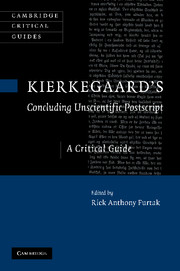Book contents
- Frontmatter
- Contents
- List of contributors
- Acknowledgments
- List of abbreviations
- Introduction
- 1 The “Socratic secret”: the postscript to the Philosophical Crumbs
- 2 Kierkegaard's Socratic pseudonym: A profile of Johannes Climacus
- 3 Johannes Climacus' revocation
- 4 From the garden of the dead: Climacus on interpersonal inwardness
- 5 The Kierkegaardian ideal of “essential knowing” and the scandal of modern philosophy
- 6 Lessing and Socrates in Kierkegaard's Postscript
- 7 Climacus on subjectivity and the system
- 8 Humor and irony in the Postscript
- 9 Climacus on the task of becoming a Christian
- 10 The epistemology of the Postscript
- 11 Faith and reason in Kierkegaard's Concluding Unscientific Postscript
- 12 Making Christianity difficult: The “existentialist theology” of Kierkegaard's Postscript
- Bibliography
- Index
- References
4 - From the garden of the dead: Climacus on interpersonal inwardness
Published online by Cambridge University Press: 04 August 2010
- Frontmatter
- Contents
- List of contributors
- Acknowledgments
- List of abbreviations
- Introduction
- 1 The “Socratic secret”: the postscript to the Philosophical Crumbs
- 2 Kierkegaard's Socratic pseudonym: A profile of Johannes Climacus
- 3 Johannes Climacus' revocation
- 4 From the garden of the dead: Climacus on interpersonal inwardness
- 5 The Kierkegaardian ideal of “essential knowing” and the scandal of modern philosophy
- 6 Lessing and Socrates in Kierkegaard's Postscript
- 7 Climacus on subjectivity and the system
- 8 Humor and irony in the Postscript
- 9 Climacus on the task of becoming a Christian
- 10 The epistemology of the Postscript
- 11 Faith and reason in Kierkegaard's Concluding Unscientific Postscript
- 12 Making Christianity difficult: The “existentialist theology” of Kierkegaard's Postscript
- Bibliography
- Index
- References
Summary
What is the essence of night,
if not lack, need, and longing?
SchellingClimacus reports a scene overheard, seen in a fugitive glance through leaves as he sat on a bench at twilight in “the garden of the dead,” a cemetery, most likely Copenhagen's Assistens Kirkegård. The scene is the grief of a grandfather mourning at the grave of his son, and speaking tearfully of the meaning of that death to a ten-year-old boy, his grandson, now fatherless. The “garden of the dead,” as it is called, is not at the city's center, but at some remove; not out in the wooded parklands, but nevertheless sufficiently alive with nature's leafy shadows and open skies that Climacus can exalt in a kind of minor ecstasy over the coming of night – as if night were an invitation for a “nocturnal tryst,” a beautiful prelude to the more tearful tableau ahead. But what can the night tell us of mood, yearning, and heartache? Night beckons with the promise of a
tryst … with the infinite, persuaded by the night's breeze as in a monotone it repeats itself, breathing through forest and meadow, and sighing as though in search of something, urged by the distant echo in oneself of the stillness as if intimating something, urged by the sublime calm of the heavens, as if this something had been found, persuaded by the palpable silence of the dew as if this were the explanation and infinitude's refreshment, like the fecundity of a quiet night, only half understood like the night's semi-diaphanous mist.
(CUP 197)Keywords
- Type
- Chapter
- Information
- Kierkegaard's 'Concluding Unscientific Postscript'A Critical Guide, pp. 64 - 86Publisher: Cambridge University PressPrint publication year: 2010

